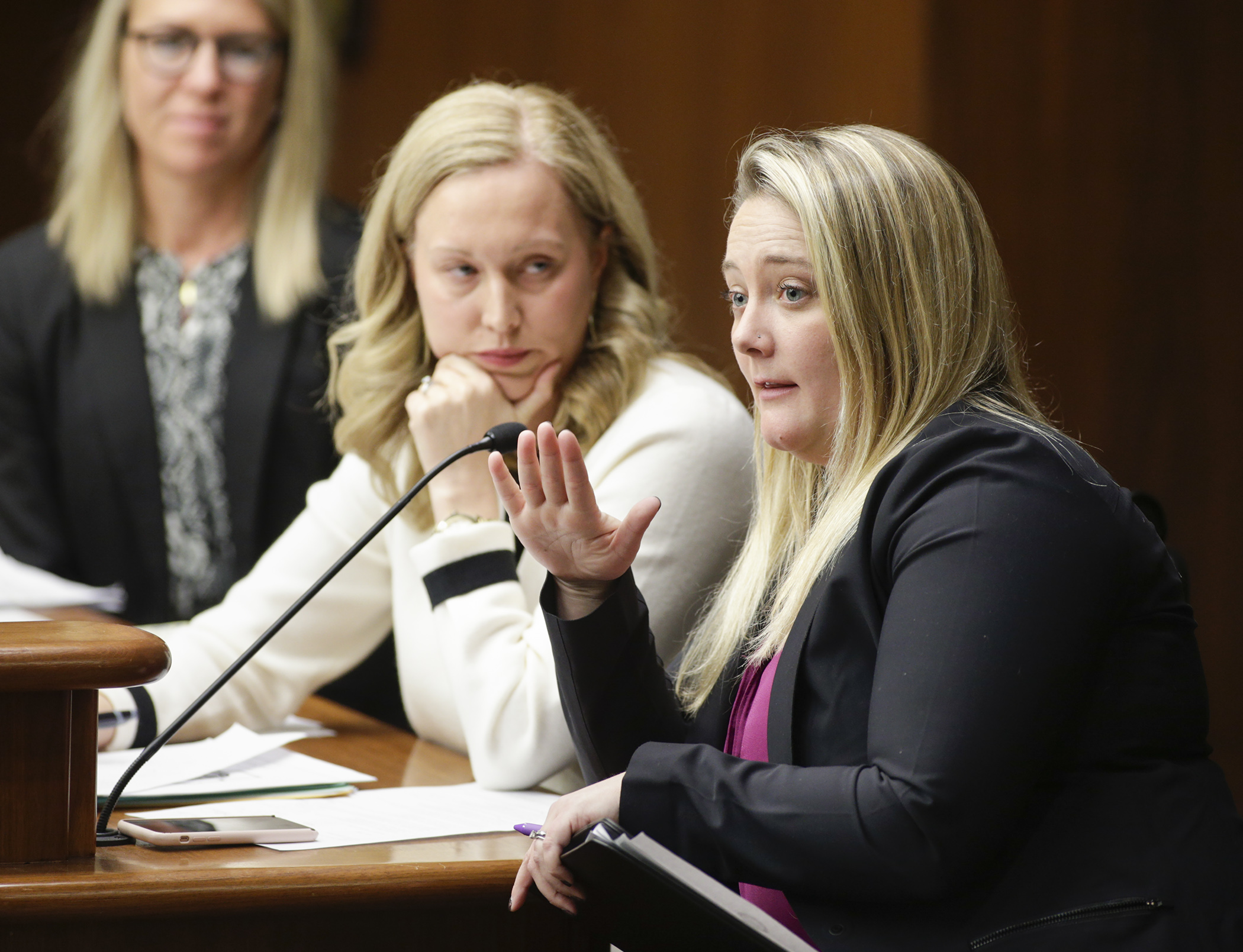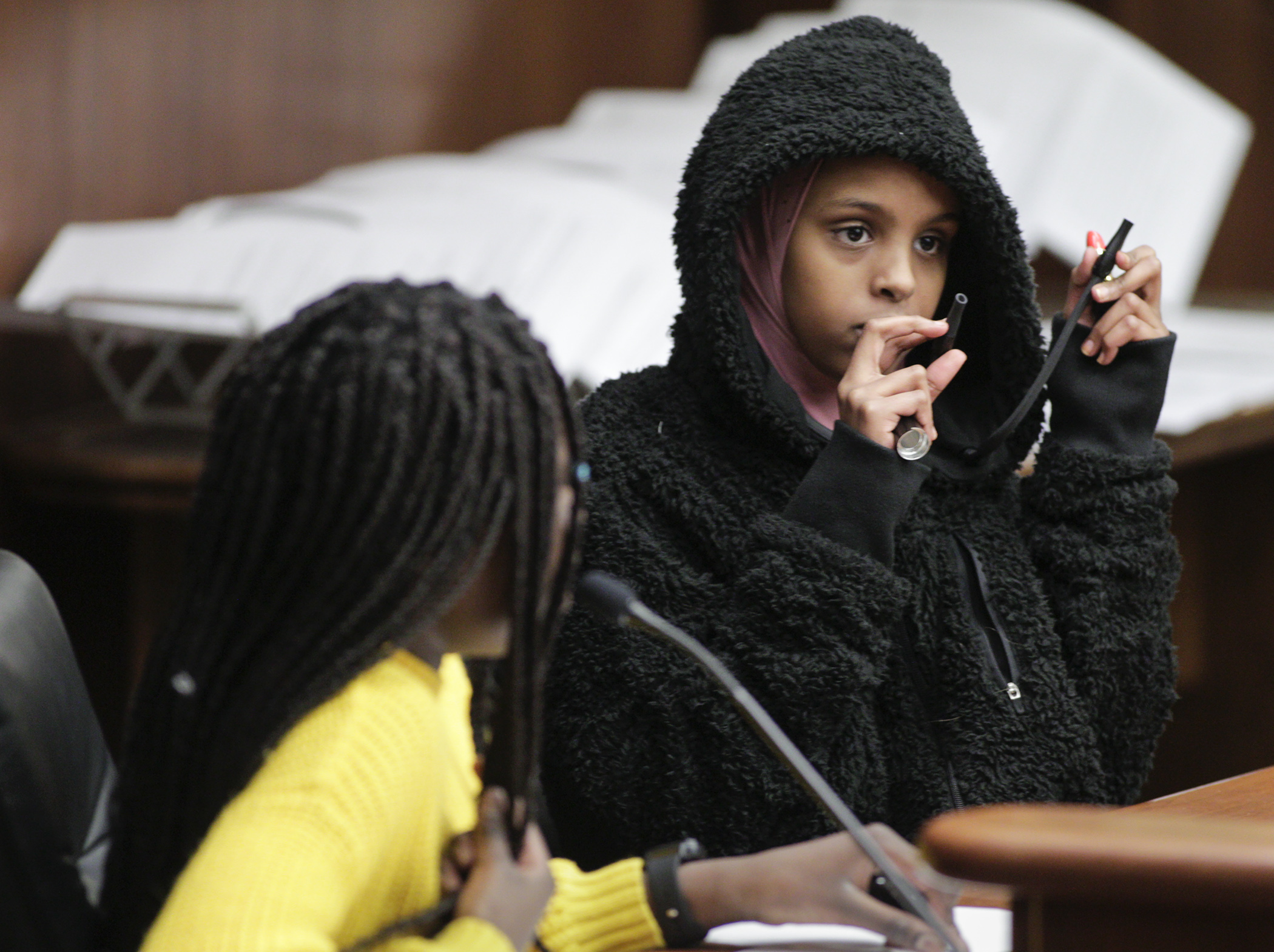Education policy division OKs pair of anti-vaping bills

Years of declining tobacco use, especially among youth, was one of the greatest health achievements, according to health experts and anti-tobacco advocates. However that progress has been quickly erased and youth smoking has now surpassed earlier rates thanks to the introduction of e-cigarettes and vaping.
“This epidemic has truly taken over in communities around our state.” said LaTrisha Vetaw, health policy and advocacy manager for NorthPoint Health & Wellness Center.
Vetaw was one several people who testified before the House Education Policy Division Tuesday on the topic of youth vaping, and spoke in support of a pair of bills geared toward reversing the trend through education.
HF3166 and HF3164, both sponsored by Rep. Heather Edelson (DFL-Edina), were and sent to the House Education Finance Division.
Data from the 2019 Minnesota Student Survey of 170,000 public school students shows a steep rise in e-cigarette use among kids and teens. Among eighth-grade students, e-cigarette usage nearly doubled from 2016 to 2019, and one in four high school juniors reportedly now vapes.
A couple of weeks ago, Vetaw spoke to a group of middle school students and asked if any of them had used e-cigarettes or knew of someone who does. “Every single student raised their hand,” she said. “I’ve worked in tobacco prevention for over 15 years and I was floored.”
According to the survey, the state’s youth are also under-informed about the health risks of vaping, with 76% of juniors saying there is either no, slight or moderate risk to using e-cigarettes. However, information from the Department of Health says products like e-cigarettes — and the nicotine contained in them — can harm brain development and may have longer-term effects on learning, memory, attention, behavior problems and can lead to future addiction.
“Our kids should be growing up strong and free from addiction, but they have been relentlessly targeted by the same industry that hooked so many of our parents and our grandparents on cigarettes,” Vetaw said.
Students in all grades surveyed use e-cigarettes at five times the rate of conventional cigarettes, which was a point reiterated by Andrew Thompson, a senior at Minnetonka High School.
“The funny thing is that students that are vaping, they’ve never touched a cigarette,” he said. “They have no idea what they’re getting themselves into.”
There have been strides made to deter youth smoking at both the local and federal levels. Recently, the federal government passed a law raising the age to purchase tobacco from 18 to 21, and it placed restrictions on the sale of flavored tobacco products. However advocates say there is still more to be done. The two proposals before the division aim to do that.
 Siham Abdilahi, a student at John Glenn Middle School in Maplewood, wears a “vaping hoodie” during informational testimony on youth e-cigarette use in the House Education Policy Committee Feb. 18. The hoodie illustrates how difficult it can be to detect vaping devices used by students. Photo by Paul Battaglia
Siham Abdilahi, a student at John Glenn Middle School in Maplewood, wears a “vaping hoodie” during informational testimony on youth e-cigarette use in the House Education Policy Committee Feb. 18. The hoodie illustrates how difficult it can be to detect vaping devices used by students. Photo by Paul BattagliaHF3166 would require schools to adopt and provide evidence-based vaping prevention curriculum at least once to students in grades six through eight. The so-called “Vaping Awareness and Prevention Act,” would also encourage districts to provide delivery of this curriculum to high school students.
The other bill, HF3164, would establish a vaping prevention pilot program with a $250,000 appropriation in Fiscal Year 2021 to be used toward grants. Schools that receive the funds would need to develop and implement e-cigarette usage prevention programs using evidence-based research.
Rep. Peggy Scott (R-Andover) referenced a component of the bill that would encourage schools to find alternatives to suspending students who are caught violating nonsmoking policies. She noted that some students may be vaping substances other than tobacco, such as THC, which may warrant suspension.
Edelson agreed that is a concern, but suggested they could also be held accountable in ways other than removing students from school.
Rep. Sondra Erickson (R-Princeton) asked if students were being informed of laws that prohibit tobacco use among minors. Lisa Smith, a health and physical education teacher at Lakeville South High School, said she teaches her students about youth smoking laws, but finds it’s not enough to deter many kids from picking up the habit.
The companion bills, SF3184 and SF3186, await action by the Senate E-12 Finance and Policy Committee. Sen. Carla Nelson (R-Rochester) sponsors both.
Related Articles
Search Session Daily
Advanced Search OptionsPriority Dailies
Ways and Means Committee OKs proposed $512 million supplemental budget on party-line vote
By Mike Cook Meeting more needs or fiscal irresponsibility is one way to sum up the differences among the two parties on a supplemental spending package a year after a $72 billion state budg...
Meeting more needs or fiscal irresponsibility is one way to sum up the differences among the two parties on a supplemental spending package a year after a $72 billion state budg...
Minnesota’s projected budget surplus balloons to $3.7 billion, but fiscal pressure still looms
By Rob Hubbard Just as Minnesota has experienced a warmer winter than usual, so has the state’s budget outlook warmed over the past few months.
On Thursday, Minnesota Management and Budget...
Just as Minnesota has experienced a warmer winter than usual, so has the state’s budget outlook warmed over the past few months.
On Thursday, Minnesota Management and Budget...